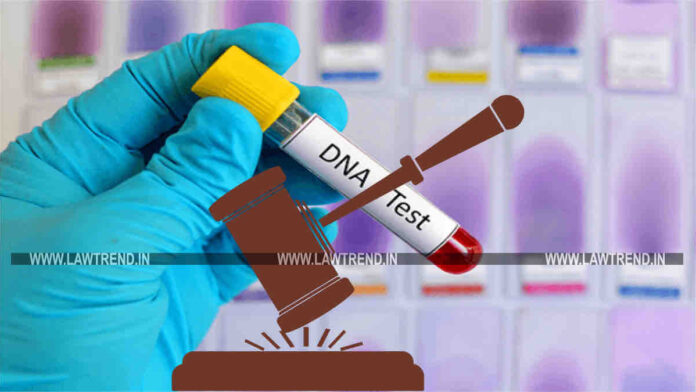The Punjab and Haryana High Court has upheld a trial court’s decision ordering a man to undergo a DNA test to determine the paternity of an adult son who filed a suit for declaration. Justice Archana Puri, while dismissing the man’s revision petition, modified the trial court’s order by ruling that police force cannot be used to compel the collection of a blood sample. The court held that in a paternity suit initiated by the child, his right to know his parentage holds precedence over the alleged father’s right to privacy, and an adverse inference may be drawn upon refusal to comply with the testing order.
Case Background
The legal dispute originated from a suit for declaration filed by a man (the plaintiff), who claimed to be the son of the petitioner (defendant No. 1) and his mother (defendant No. 2). The plaintiff contended that his mother and the petitioner developed a relationship in 1988 after the petitioner became a tenant in her house. He asserted that they began living together as husband and wife, and he was born from their union in 1990.
According to the plaint, the plaintiff lived with both defendants until 2000, when the petitioner left the household. It was also alleged that the petitioner had clandestinely entered the name of the mother’s former husband as the father in the plaintiff’s school records.
In his written statement, the petitioner denied the claims, stating that the plaintiff was a stranger to him and not his biological son. He pointed out that the plaintiff’s mother divorced her previous husband on February 26, 1994, which was after the plaintiff’s birth in 1990. The mother, in her separate written statement, admitted to the assertions made by her son.
During the trial, the plaintiff filed an application seeking a DNA test for the petitioner to establish paternity. On November 27, 2015, the trial court allowed the application and directed the parties to appear at the Forensic Science Laboratory for the test, further ordering that police assistance could be used if necessary. Aggrieved by this order, the petitioner filed the present revision petition before the High Court.
Arguments of the Parties
Counsel for the petitioner argued that the plaintiff was born during the subsistence of his mother’s marriage to her former husband. Therefore, under Section 112 of the Indian Evidence Act, a conclusive presumption of legitimacy arises, and paternity cannot be fastened upon the petitioner. It was submitted that there was no evidence of “non-access” between the plaintiff’s mother and her then-husband. The petitioner contended that forcing him to undergo a DNA test would be an infringement of his “right of dignity and privacy.” Reliance was placed on several judgments, including Goutam Kundu vs. State of West Bengal and Ivan Rathinam vs. Milan Joseph.
Conversely, counsel for the respondent-son argued that it was in the “best interest” of the plaintiff, who is now a major, to know his parentage and the rights emanating therefrom. It was submitted that courts have the power to order such tests to ensure justice for a child seeking to determine his biological father.
Court’s Analysis and Findings
Justice Archana Puri began her analysis by examining Section 112 of the Indian Evidence Act, which creates a strong presumption of legitimacy for a child born during a valid marriage. The court noted the principles laid down by the Supreme Court in Goutam Kundu, cautioning that DNA tests should not be ordered in a routine manner and only when a strong prima facie case of non-access is established.
However, the Court distinguished the present case from precedents where one of the spouses disputes the child’s paternity. Justice Puri observed that the rationale of those decisions would not apply where the child himself, upon attaining adulthood, moves the court to assert his paternity. The Court stated, “In that eventuality, application of Section 112 of the Indian Evidence Act does not arise.”
The Court emphasized the need for “balancing of the interest” and the “eminent need” for the DNA test. It observed, “The child, as a plaintiff, has a right to know his parentage in the context of denial of relationship by defendant No.1… Justice to this child/plaintiff, is a factor, not to be ignored. Rather, his assertion demands that truth be known, when truth has to be established, as it undoubtedly can.”
Addressing the petitioner’s claim of a right to privacy, the Court held, “However, the right of privacy, as such, cannot override the right of the child and vest interest in his favour.” The Court noted that the plaintiff and his mother, being of mature age, were aware of the consequences of the litigation.
The judgment further noted that the DNA test is the “surer test to affix the paternity” and would assist the court in reaching a just conclusion. The Court questioned the petitioner’s reluctance, stating, “Why there should be any hesitation to undergo this test is not coming forth.”
While upholding the direction for the test, the Court modified the part of the order that sanctioned the use of force. Citing Supreme Court guidelines, it reiterated that “no one can be compelled to give sample of blood.”
Decision
The High Court dismissed the revision petition and upheld the trial court’s order for a DNA test. However, the order was modified to exclude the use of police assistance or any form of compulsion. The Court directed that in the event of non-compliance by the petitioner, the trial court shall record the disinclination and is entitled to draw an adverse inference against him at the appropriate stage of the proceedings. The observations made in the judgment were confined to the disposal of the revision petition and were not to be construed as an expression on the merits of the case.




